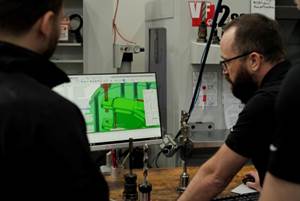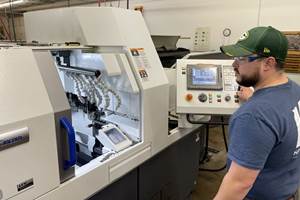Job Shop Cuts Cables to Save Time on Data Transfers
At Stollen Machine & Tool Co., uninsulated cables could not reliably transport CNC programs from the computer to the machines. Six wireless RS232 units from Shop Floor Automations have resulted in 15 percent daily time savings.
Share





Hwacheon Machinery America, Inc.
Featured Content
View More


In a job shop, a factor that may seem trivial can have a big impact on overall production efficiency. For Doug Stollen, owner of Stollen Machine & Tool Co., that factor was the cable connection he used to transport CNC programs from his computer to the machines on his shop floor. When he realized how much time he was losing due to their unreliability, he invested in six wireless data-transfer systems from Shop Floor Automations (La Mesa, California). Mr. Stollen says this simple change has saved him 15 percent of his time per day.
Stollen Machine & Tool Co. of Kenilworth, New Jersey, is a fourth-generation, family-owned job shop that was founded in 1954. According to Mr. Stollen, the shop specializes in larger, more complex projects that cannot be sent overseas or done cheaply. He says the shop’s products must be made in America because the work is more involved and customers like to come in to check how work is progressing during the different stages of production.
As technology advanced over the years, Stollen Machine transformed with it. To keep his shop thriving, Mr. Stollen is committed to updating old, outdated and unreliable technology such as the flawed cable system for transferring data. Often, when he transferred CNC programs made on his office computer to the machines on the shop floor, only parts of the code would make it to the machine. Other times, none of the code would make it to the machines. “Sometimes the cables would just stop working completely,” he says. Problems with the cables worsened during the summer, when the weather was hot and humid.
According to Mr. Stollen, he was losing productive hours every day dealing with the problem and wondering if he would be able to send and receive these vital programs. He was second-guessing everything and looking through the code every time it did reach the machines, he says.
Knowing that the age of the machines was not the issue, he began researching solutions to his cabling problem. He compiled information he found online about the cost to have a team of people set up new, better-insulated CAT5 cables versus the cost to make the leap to wireless. Ultimately, he decided to replace the cable system with six RS232 wireless units from Shop Floor Automations that enable users to connect the machines to wireless networks for transferring data. The units are designed to withstand industrial environments, and he installed them on six different machines in a single day.
RS232 is a standard for serial communication transmission of data. It formally defines the signals between data-terminal equipment, such as a computer terminal, and data-circuit-terminating equipment, such as a modem. The RS232 standard is commonly used in computer serial ports, and it is one of the communication interfaces installed on CNC machines that allow them to upload and download data.
With the new wireless system, programs are fully transferred from the computer to the machine every time, and Mr. Stollen does not have to check the code multiple times to ensure it has completely transferred. “I would say it saves me around 15 percent of my time every day,” he estimates.
The wireless units came with some additional benefits as well. For instance, Mr. Stollen did not have to pay to replace the shop’s cable infrastructure, and he did not have to increase his insurance to replace the cables. He also notes that he did not have to downsize his manpower to afford new machines or equipment.
The wireless data transmitters give him more peace of mind. “It saves me all that extra work of having to worry about whether the codes are coming through correctly or not,” he says.
Related Content
Tips for Designing CNC Programs That Help Operators
The way a G-code program is formatted directly affects the productivity of the CNC people who use them. Design CNC programs that make CNC setup people and operators’ jobs easier.
Read MoreAutomated CAM Programming – Is Your Software Really Delivering?
A look at the latest automation tools in Autodesk Fusion 360 software and how forward-thinking machine shops and manufacturing departments are using them to slash delivery times and win more business.
Read More4 Commonly Misapplied CNC Features
Misapplication of these important CNC features will result in wasted time, wasted or duplicated effort and/or wasted material.
Read MoreERP Provides Smooth Pathway to Data Security
With the CMMC data security standards looming, machine shops serving the defense industry can turn to ERP to keep business moving.
Read MoreRead Next
Registration Now Open for the Precision Machining Technology Show (PMTS) 2025
The precision machining industry’s premier event returns to Cleveland, OH, April 1-3.
Read More5 Rules of Thumb for Buying CNC Machine Tools
Use these tips to carefully plan your machine tool purchases and to avoid regretting your decision later.
Read MoreBuilding Out a Foundation for Student Machinists
Autodesk and Haas have teamed up to produce an introductory course for students that covers the basics of CAD, CAM and CNC while providing them with a portfolio part.
Read More

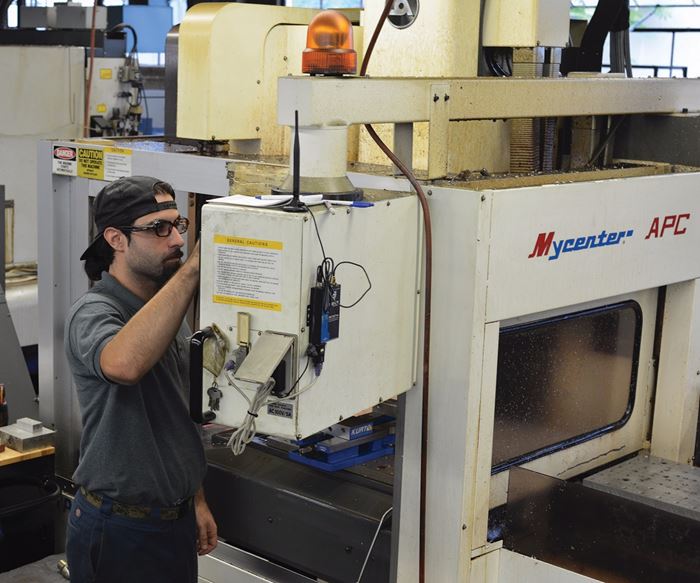
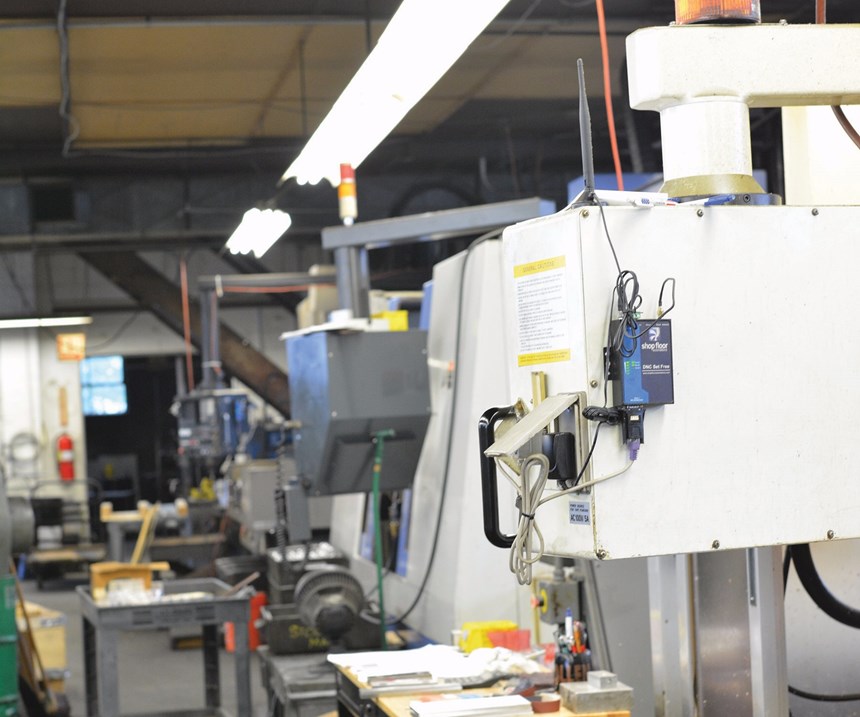
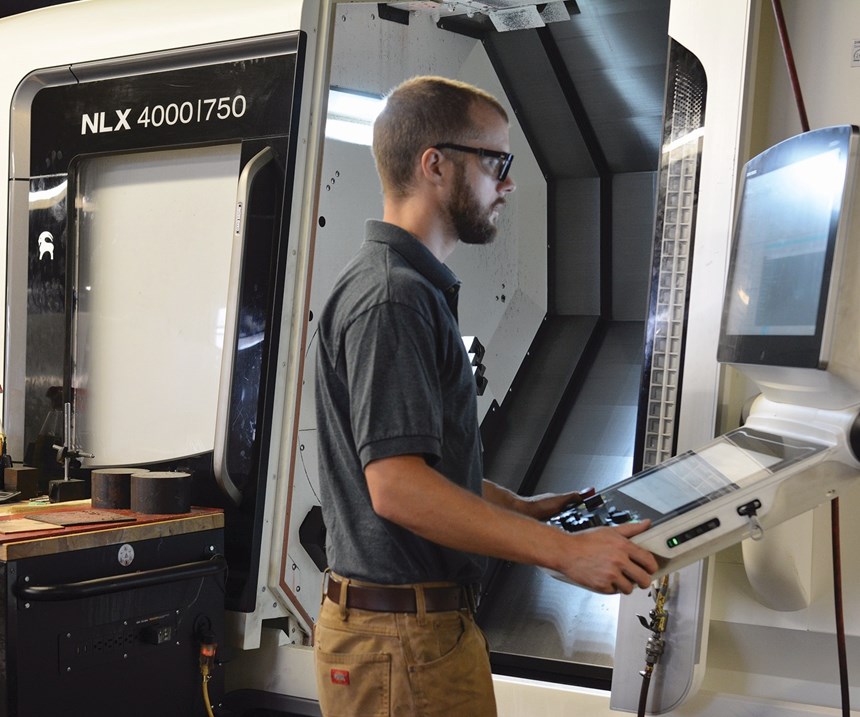

























.png;maxWidth=150)














.jpg;maxWidth=300;quality=90)

